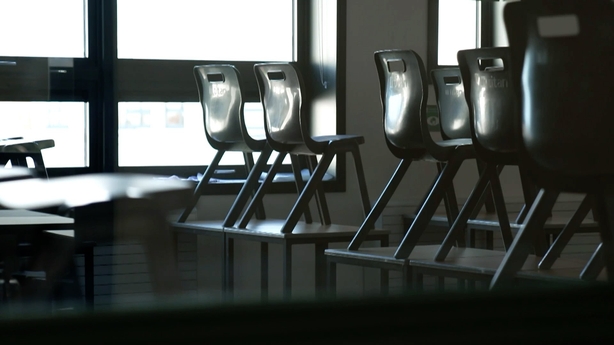"I'm a member of the first ever generation that will be worse off than my parents." When Holly Cairns was elected leader of the Social Democrats in early March, it was this line that caught attention.
Ms Cairns is 33-years-old, her generation was born in the late 1980s and early 1990s, raised at a time when the country was beginning to shake off the depressed economy and unemployment that pushed young adults out of the country in their droves.
The children of the 90s grew up at a time when there were more jobs for their parents, houses were within buyers' reach and a rising economic tide was starting to lift the boats of many.
For the children of the time, there was the promise of a better country and better lives for all of them. It was a generation raised on optimism. Of course, the children of the 90s are now the adults of today. If they are the same age as Holly Cairns, they left school around the same time as the economy was collapsing. If they went to college, they likely entered a jobs market with lower wages than during the boom.
As they make their way now through adult life, they may feel that many of the choices that their parents had at the same age simply are not available to them. But are they right in thinking that the game of life is now rigged against them?
Aidan Regan, professor of political economy in UCD, says that it depends on what you mean by worse off. "What does it mean to say someone's better off? I suppose we typically think about that in very material ways. And we could talk more broadly about whether or not Ireland is a better place to live today compared to previous generations. And I think they're two very different things."
We should be careful about generalising, not every person in any generation has the same experience, but he does believe that it is broadly true that the average 30-year-old in 2023 is materially worse off than the average 30-year-old in 1993.
Having said that, 30-somethings now are better educated, they can travel more and have a higher life expectancy than the generations before them. They have many options their parents didn't have. Cormac Lucey is economics columnist with the Sunday Times Ireland and doesn't believe our generation of millennials is any worse off.
"If you look at the economic data, if you look at consumption data as opposed to GDP or any other measure of national income, then we're about 80% or 90% better off than we would have been 25 years ago. And that's including housing. So we're a lot better off than we would have been a generation ago if you take 25 years as the gap between two generations. So on a factual basis, I think [Holly Cairns’] assertion is mistaken and wrong."

But what about those people who are at that stage in life now? Conall O'Dufaigh lives and works in Co Wicklow with his partner. He is the same age as Holly Cairns and has worked as a secondary school teacher since 2016, a job that in times past would have been seen as safe, secure and a safe bet for getting a mortgage.
Conall's partner works in youth mental health services and they are both currently living in a one-bedroom apartment in Bray. It is not where they would like to be at this stage in their lives. "When we first went for that flat, our landlord was surprised to see a couple who were both professionals going for something that he had conceived of renting out to one person."
The couple are doing their best to save. Conall knows that buying a house was not exactly easy 30 years ago, but his parents, both teachers, bought a semi-detached house in south county Dublin at the same age he is now. He says their current situation is manageable, but saving to get out and buy their own house is difficult on top of it. "It's not like, for example, in the 1980s. People will tell you stories like they had two or three very tough years where they saved. We've been living in this situation for five years."
As Aidan Regan outlines, Conall and his partner are not atypical. "30% of those between that age group, 25 to 35 approximately, are homeowners. Whereas in the past, in the early 90s, that would be as high as 70%. For those aged between 35 and 45, in the past and the early 90s, well over 80% of those people would have been homeowners. Today it's dropped down to about 60%."
So, when our safe and dependable state jobs are no longer enough to buy a house, or be comfortable renting, what kind of job and salary is now required to live what would have been considered a normal lifestyle 30 years ago?
Trayc Keevans is a consultant with recruitment firm Morgan McKinley. "Well, those that we are seeing are having a better lifestyle, are probably earning north of €70,000 in terms of salary. Those earning less than that are looking at combined income, home income, to enable them to afford, particularly in the capital and major cities around Ireland."
For young professionals, ostensibly earning good salaries, this is impacting on their own aspirations – whether it is buying a place of their own or simply getting out of their parents' house. Trayc Keevans told Prime Time that even those who can make the jump are having to compromise: "Young professionals today, while we've said the average salary is €45,000, you'd expect somebody, say, a newly qualified accountant who would be earning €60,000 a year, would expect that's a comfortable salary, that they should be able to afford accommodation, live on their own, live centrally, have a good quality of life. The reality of that, though, isn't the case. And they're finding they're having to share."
It may be of small comfort to those who, despite earning high salaries, are still struggling to pay the rent but when it comes to employment opportunities and demand for skills, it is possible that no generation has ever had it better.
Caroline Reidy, managing director of the HR Suite, says the country has never seen employment higher than current levels, which is increasing demand for certain workers. It is not just in sectors like tech or the professions, Ms Reidy says that mechanics, bakers and other skilled workers are also in huge demand, which in turn is driving wages upwards. Young professionals can afford to be choosy about where they would like to work.
"Companies are getting a lot more competitive. We've seen big salary increases in certain sectors and in certain industries to retain talent because we've never had a fuller labour market."

Regardless of their professions, millennials have for a long time had to put up with the tired cliché about avocado toast and nice coffees being the reason they cannot save money or buy their own homes. What is true is that, housing aside, Ireland is a changed and more prosperous country than when they were children. There is better healthcare, new technologies and great advancements in entertainment. There is the prospect of grabbing a cheap flight for a weekend away. Much of what we take for granted now was a futuristic concept even 30 years ago.
But does a better quality of life make up for the lack of somewhere to live it? For Conall O'Dufaigh, it is a superficial way of viewing what life is like now for his generation. For all the advancements, it is about the fundamentals for him; being able to afford a place to live, enjoy a comfortable life and try to save a little each month once all the bills are paid.
"The lived reality of 2023 kind of leads you to think that these things are luxuries. But they're not luxuries, they're normal. They're things that we would have not thought twice in previous generations about having. And by that, I don't mean any specific amenity like a car or anything like that. I mean security. I mean the things you need to live your life as normal without that undue stress of precarity and financial burdens."
Of course, so much comes back to the roof over people's heads. If millennials on above average salaries are struggling to buy and rent, how can they possibly expect to be as well off as their parents? And could this generation gap ultimately create a political chasm?
Aidan Regan believes it has already happened and that the decline in home ownership is fuelling a realignment in Irish politics. "We've seen it already in the 2020 election. One of the striking data points that I took from, for example, the Irish Electoral survey was that Sinn Féin took more votes amongst public and private renters than Fianna Fáil and Fine Gael combined. I would expect if there was an election tomorrow, those numbers would be even more amplified."

He also believes that the Social Democrats can compete with Sinn Féin for a share of that vote. Cormac Lucey agrees and feels that Holly Cairns’ statement could act as a clarion call for that generation: "She's articulating a message that no other party has articulated in such a crystallised, generationally focused manner. We also have an electorate who I think are quite bored by a lot of the conventional political offerings and if they go to vote, they have to vote for somebody and they may well vote for her, and her party, on the basis that it seems to be offering something fresh. Now, other parties are going to respond to that and try and come up with fresh offerings of their own, but right now she's making the freshest offering."
Certainly, it is a message that has resonated with Conall O'Dufaigh and his friends of the same age. The feeling he is stuck with now is one of growing older without being any better off.
"You're kind of trapped in this perpetual thing as you were in in your early to mid 20s, where you can pay for your rent, you can pay for your living expenses, just about. And after that, try to save, if you can. Most of my friends are in that situation. Very few have broken out of it."






